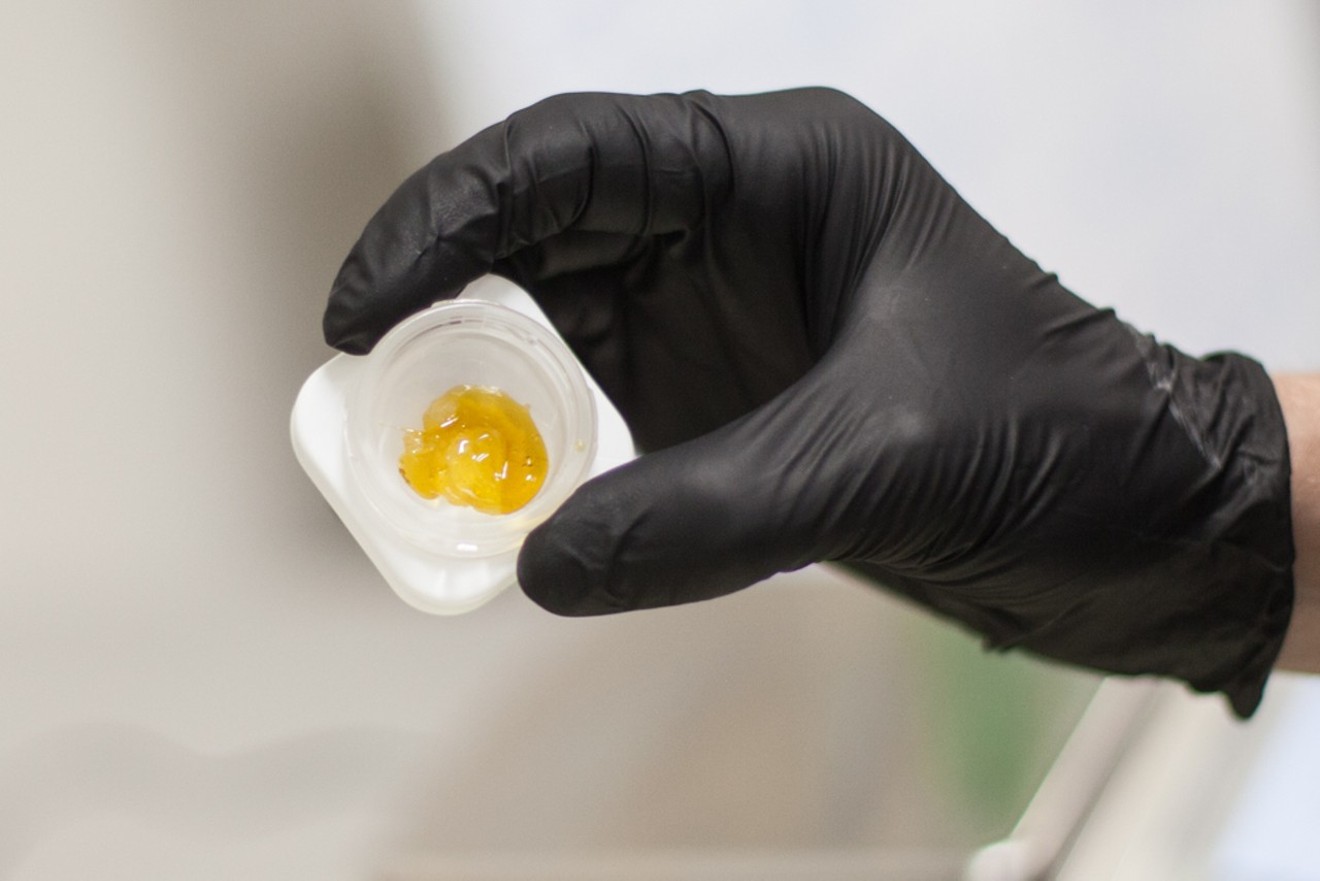A new bill proposed by Alec Garnett, Colorado's Speaker of the House, calls for more packaging restrictions for commercial marijuana concentrate and tighter rules for medical marijuana patients and physicians, including a required THC dosage amount and tracking system for patient purchases.
After months of negotiations around limiting the potency of legal marijuana products, late last week lawmakers and a powerful portion of the pot industry reached a compromise bill. And while that proposal doesn't include a potency limit, it does contain a new set of guardrails, studies and tracking provisions intended to reduce youth marijuana use and diversion to the black market.
Officially introduced on May 14, House Bill 1317 would require further review of a medical marijuana patient's mental health history before a recommendation is made, and that recommendation would have to include documented levels of THC potency, dosage form, daily authorized quantity and consumption instructions for patients.
Medical marijuana sales would be monitored under a new state tracking system, with medical concentrate purchases restricted to 8 grams per day unless the patient was between eighteen and twenty, in which case the limit would be 2 grams per day; homebound patients and those with proper doctor certification could buy more than those limits. The state's current limit for medical concentrate purchases is 40 grams of concentrate.
Garnett's proposal includes a provision requiring all THC concentrate to be packaged in servings of ten per gram, similar to how edibles are currently regulated, by the beginning of 2023.
The language of the bill would also require the Colorado School of Public Health to conduct a systematic review of scientific research "related to the physical and mental health effects of high-potency THC marijuana and concentrates"; those findings would be used to create a public education campaign. The measure would also require coroners to annually report the results of THC toxicology screens in suicide, overdose and accidental deaths for people under the age of 26 to the Colorado Violent Death Reporting System.
The compromise measure has strong support among Democrats, who have been discussing forms of tighter marijuana regulations for over a year with industry stakeholders and potency cap proponents. After a draft surfaced from Representative Yadira Caraveo, a Democrat and a physician, suggesting a THC limit on concentrate products, the resulting pushback from Colorado's billion-dollar cannabis industry shifted the potency-limit conversation, according to a joint statement from the Marijuana Industry Group and Colorado Leads, two of the state's largest marijuana trade organizations — both of which support Garnett's effort.
"We have been at the table for months to produce a balanced policy measure, and we very much appreciate that the conversation has shifted to a more evidence-based approach to cannabis regulation," their statement reads. "The cannabis industry has always supported youth prevention efforts and strict regulations that keep marijuana out of the hands of teenagers. That’s why we support an even more robust tracking system that limits the amount of medical marijuana concentrate 18- to 20-year-olds can purchase, as well as other provisions that make it harder for teenagers to obtain marijuana illegally."
Marijuana usage rates have remained flat in Colorado since legalization, according to the CDPHE, but the use of high-potency marijuana products rose significantly among teenagers from 2017 to 2019, and has more than doubled since 2015.
While recreational sales in the state are limited to those 21 and older, people between the ages of 18 and 20 in Colorado can apply for a medical marijuana card. Pointing to state Medical Marijuana Registry data showing that there are around 4,000 patients in that age range and around 150 patients ages 11 to 17, groups of concerned parents and health-care professionals said they were worried that patients under 21 could sell medical marijuana to children, who are at higher risk of mental health impacts from THC. Two of the main groups that pushed potency legislation, Smart Colorado and Blue Rising PAC, now officially support Garnett's bill.
The compromise bill does face opposition, however.
According to Southern Colorado Cannabis Council director Jason Warf, the vast majority of medical marijuana businesses would suffer from the legislation, and patient access would be widely reduced — especially in Colorado Springs, where no recreational sales are allowed. Warf says that he and many of his colleagues didn't see HB 1317's language until it was leaked a day before the bill's introduction, despite MIG and Colorado Leads having had "months" of discussion with Garnett.
"We've all met with the Speaker and Representative Caraveo, and there's not been a word since months ago that something like this would be introduced. In fact, we were told the opposite, and that something would be coming next session," Warf explains. "I would say the strong majority of businesses in Colorado Springs are opposed, and that's the second-biggest market in the state."
Warf acknowledges that some purchasing rules in the state's current medical marijuana system could be tightened, but adds that he believes the proposed new rules for physicians and dosage go against the intent of Amendment 20, the constitutional amendment passed in 2000 legalizing medical marijuana use in the state.
According to Black Brown and Red Badged, a coalition of Black and Brown marijuana business owners, its members support some of the proposed medical regulations, but they are also concerned that they were excluded from the conversation surrounding HB 1317, and believe the measure carries racial implications. Executive director Hashim Coats says that his group is concerned that THC data collection used after non-natural deaths could be used against Colorado's Black community.
“The current draft legislation has serious racial bias implications and racial blind spots, particularly in the areas that address data collection and research,” he says. “We are supportive of some important provisions of this bill, [but] we are unfortunately still incredibly concerned about the racial tone-deafness and exclusion of Black voices from the discussion, which any legislation of this nature should include, and that the bill at this point has yet to strike the right balance."
The costs of separating marijuana concentrates into ten servings would be untenable for the majority of BBRB members, Coats adds, and could add to further market consolidation.
"While this may be a feasible cost for large corporate marijuana chains to absorb, this will certainly put our members out of business,” he explains. “Further, it will do nothing to keep marijuana concentrates out of the hands of kids, which is the problem we thought we were addressing and an issue we committed to."
There is less than a month remaining of the 2021 legislative session, but HB 1317 is moving fast. The bill's first hearing will be Tuesday, May 18, in front of the House Public & Behavioral Health & Human Services Committee.
[
{
"name": "Air - MediumRectangle - Inline Content - Mobile Display Size",
"component": "12017618",
"insertPoint": "2",
"requiredCountToDisplay": "2"
},{
"name": "Editor Picks",
"component": "17242653",
"insertPoint": "4",
"requiredCountToDisplay": "1"
},{
"name": "Inline Links",
"component": "18838239",
"insertPoint": "8th",
"startingPoint": 8,
"requiredCountToDisplay": "7",
"maxInsertions": 25
},{
"name": "Air - MediumRectangle - Combo - Inline Content",
"component": "17261320",
"insertPoint": "8th",
"startingPoint": 8,
"requiredCountToDisplay": "7",
"maxInsertions": 25
},{
"name": "Inline Links",
"component": "18838239",
"insertPoint": "8th",
"startingPoint": 12,
"requiredCountToDisplay": "11",
"maxInsertions": 25
},{
"name": "Air - Leaderboard Tower - Combo - Inline Content",
"component": "17261321",
"insertPoint": "8th",
"startingPoint": 12,
"requiredCountToDisplay": "11",
"maxInsertions": 25
}
]













